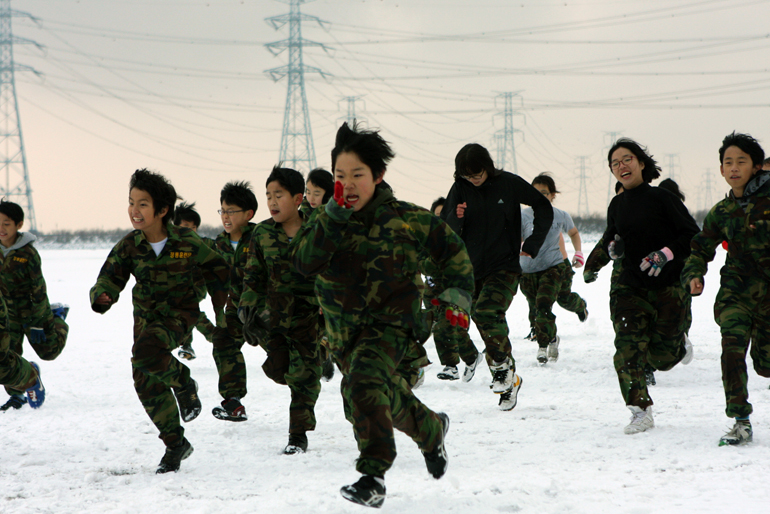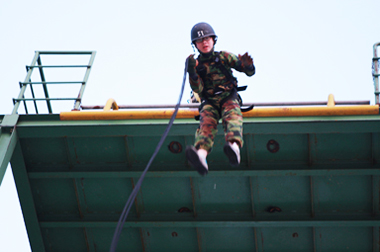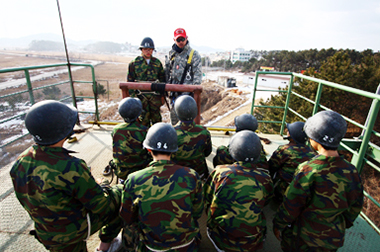Five high school students drowned to death at a private seaside boot camp in South Korea, igniting discussions over the prevalence of military-style booth camps as well as nostalgia for the military culture in Korean education.
In South Chungcheong Province, five students died during the three-day military-style boot camp in which instructors forced students to take off their life jackets and jump into the sea in late afternoon. Among 23 students caught by a strong current, five went missing and their bodies were discovered the next day.
Before the official funeral was held [ko] on July 24, 2013, the victims’ classmates posted a short video expressing their condolences on YouTube (English subtitles not available):
Police later found out that some instructors were unqualified part-time hires just for the busy summer season. Furthermore, the boot camp has misleading used the marine corps's name, despite they have no link with the armed forces.
Although immediate reactions to the tragedy were focused on criticizing the lax safety and flawed operations of unauthorized boot camps, bloggers and Twitter users later expressed concerns about the prevalence of military culture in Korean education that stomps on students creativity and individuality and hinders the democratic decision-making process.
Military-style boot camps is one of the most popular options for seasonal activities in many Korean schools and ‘Gyoryeon‘ [ko], or practical military training for kids, had been one of the mandatory subjects for high school students for about three decades. The subject was downgraded to an optional subject in 1997 and officially disappeared [ko] from the school only last year.

Image of Boot Camp in South Korea. Unrelated to the camp responsible for the accident. Image by Flickr user @fast8000 (CC BY-NC-SA 2.0)
@blu_pn: 해병대캠프 사고로, 극기라는 이름의 병영훈련에 경악하는 분들이 많다. ● 허나 기억할랑가 모르겠다. 나 어릴적 학교에서는 교련이라는 군사훈련을 정규수업으로 받았고, 조회시간엔 군대식 사열과 교장선생님께 거수경례를 했었다[…]
@blu_pn: After the Marine boot camp accident happened, so many people expressed utter shock toward boot camps and their self-discipline by extreme training. But do you remember? When I was a kid, I had a military training named ‘Gyo-ryeon’ as a part of my formal education. And in the morning announcement hours, we [school kids] lined up into a military formation and made military salutes to our principal.
Prominent blogger Impeter traced backed the long history [ko] of military culture in Korean modern education:
[…] 1969년 안보의식과 전시상황에서의 대처능력을 높인다는 목적으로 고등학교 필수과목으로 ‘교련'을 지정했습니다. 당시 교련을 받은 대부분의 학생들은 그저 학교에서 하는 과목이라고 생각했지만, 지금 돌이켜보면 전쟁이 나면 고등학생까지 총을 들고 전장에 내보내겠다는 끔찍한 일이었습니다. 고등학생을 군인으로 만들려고 하니 군대와 똑같은 체벌과 군인정신을 학교에서 요구하기 시작했습니다. […] 우리 교육의 가장 큰 문제는 잘못된 명령이라도 무조건 따라야 한다는 일제강점기 조선총독부가 조선의 아이들을 소년병으로 만들려는 군국주의 교육 습성이 군사독재 정권으로 이어지면서 아직도 학교에 남아 있기 때문입니다.

Image of Boot Camp in South Korea, Unrelated to the camp responsible for the accident. Image by Flickr user @fast8000 (CC BY-NC-SA 2.0)
In 1969 [Editor's note: that year, the military tension between North and South Korea was one of the highest, reaching almost to a pre-war situation] the government made ‘Gyoryeon’ into a mandatory subject in order to raise public awareness of national security and to be better prepared for wartime. Most students, without further thinking, just accepted it as one of those subjects learnt in schools, but if you really think about it, it is quite horrible situation. It reflects that the government had thought of dispatching even high school kids to a war zone when war broke out. Since they wanted to make soldiers out of high school kids, schools started enforcing those kids to have military spirit and adopted almost the same corporal punishment used in the army […] The biggest problems in our education is [the belief that] ‘students need to obey even the wrong orders’ which was born during the Japanese colonial era– Japanese colonial government had turned Chosun dynasty's kids into boy soldiers [during the World War II era] by injecting militarism in education. And this tradition survived as Korean military authoritarian regimes took power [from 1960s – 80s], leaving traces of militarism in our schools.
Kim Yong-Taek, who spent his entire lifetime as an educator, wrote this analysis [ko] in his education blog:
‘군대 갔다 오면 사람 된다’는 말이 있다. ‘말썽 부리고 반발하고 부모 알기를 우습게 알던 아들이 군대 가더니 딴 사람이 되어 돌아왔다’고 좋아하는 부모들이 있다. 과연 그럴까? ‘군대’갔다 오면 사람‘된다’는 말은 고생을 모르고 자란 자녀가 부모와 헤어져 살아보니 철이 든 것이지 군에 갔기 때문에 달라진 게 아니다. 달라졌다면 순진한 젊은이가 ‘폭력에 순종하는 인간성으로 바뀌었다면 그게 달라졌을 뿐이다[…] 개성이니 창의성이니 소통과 비판과 같은 민주주의란 군사문화와는 거리가 멀다. 명령과 복종이 필요할 뿐이다. 그럴 수밖에 없는 것이 적과의 대치 속에서 살아남기 위해서는 강인한 체력과 인내심이 기본이요, ‘시키면 시키는 대로 해야 하는 복종만이 살 길이다[…] 민주시민으로 자라도록 가르치는 학교에서 배우는 학생들에게 군사문화를 주입시킨다는 것은 반민주주의요, 반교육이다.

Image of Boot Camp in South Korea. Unrelated to the camp responsible for the accident. Image by Flickr user @fast8000 (CC BY-NC-SA 2.0)
There is a saying that the army makes someone into a real man. Some parents even happily say ‘my son, an unruly brat who used be so disrespectful to his own parents, has became another human being once he served in the army’ [All able-bodied Korean men are obligated to two years of military service] HOWEVER, is that true? It is natural for a spoiled kid turning into a more mature human after they were separated from their parents. If there is any real change made by the army is that ‘a naive young man has turned into a obedient person who succumbs to violence’ […] Democracy [promotes] creativity and individuality and [is open to] communication and criticism, and it is very different from the military culture. Under military culture, which takes place under extreme situations of confronting the enemies, strong physical strength and patience are a must and obedience to higher authorities is their only way for survival. How a school, an entity that should guide students to become democratic citizens, injects the military culture into these kids? This is an anti-democratic decision that disagrees with the spirit of real education.







1 comment